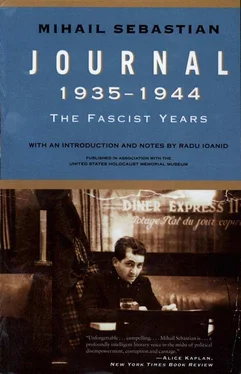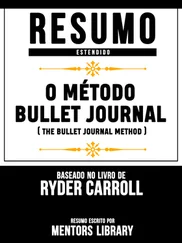He is a Jew with passion. He is furious that during his two weeks here he has been hanging around with a group of Romanians and that no one told him they were Legionaries. (A lawyer named Stânescu, the lover of Doina Missir.)
He is a Hollywood scriptwriter, mad about the theatre, but so far none of his plays has been performed. He has been working for years at Metro-Goldwyn. With much friendly curiosity, he asked hundreds of questions about me and my plays. He knew about the Steaua fără nume business. He went to the Baraşeum yesterday. He’d like us to write a play together, and regretted (as I did too) that we hadn’t met on his first day in Bucharest; then we might have had time to do something.
He is young, full of vitality, honest and straightforward, concerned about us as Jews, concerned about the reality of democracy. A person. A new figure. Someone.
I have heard from Marietta Rareş that Nina Eliade is dead. A telegram from Lisbon brought the news ten days ago.
A wave of memories rises up from the past: her little room upstairs at Pasajul Imobiliara; the typewriter on which she copied almost simultaneously Maitreyi 6and Femei ; the evening visits to Mircea’s attic on Strada Melodiei; their unexpected love; Mircea’s flight to Poiana; Nina’s despair and my helpless attempts to console her; Mircea’s return, their engagement, and two years later their civil wedding, in secret, at the town hall on Calea Rahovei; their apartment on Bulevardul Dinicu Golescu, then on Palade; our walks in the mountains, the summers in Breaza, the games in Floria’s yard at Strada Nerva Traian; our years of fraternal friendship — and then the years of confusion and growing apart, until it all broke down in hostility and oblivion.
It’s all dead, all vanished, all lost forever.
A cable arrived today at Strada Antim, sent the day before yesterday from Vatican City and bearing the marks of the Russian censorship.
“Etat. Mihai Sebastian Strada Antim 45 Buc.
“Cité Vatican , 25, 44, 15, 1020
“Maison éditrice La Caravella — Rome propose publier traduction roman Accidentul versant droits auteur dix mille lires italiennes. Stop. Si acceptez, somme sera déposée légation jusque possibilité transfert. Stop. Prière télégraphier immédiatement réponse Légation Roumanie Vatican. Grigorcea.” 7
I don’t know what La Caravella means, nor how much ten thousand lire are worth, nor what I shall answer, nor whether the book will actually appear. But the telegram gave me very great pleasure.
Is it possible that my writing will one day break out of this blind alley? Suddenly I seem to be less alone, less poor, less useless.
The last performance of Potopul.
How mysterious is success in the theatre. I was in the auditorium and looked carefully around me. Badly acted, badly produced, with inexpressive sets and mediocre actors (Finti false, Mârutà declamatory, Vurte-jeanu humorless, Athanasescu plain stupid). It all seemed worthless and inauthentic — yet it went down well. The audience listened, believed, applauded. That is what’s called a hit.
It has had a run of eighty-five performances. No doubt others have done better in central Bucharest. For me it has been an excellent little business, bringing me in nearly 400,000 lei. I have never received so much before from anything in the theatre, earned with so little effort.
But can I do a job like that? It’s so cheap and easy as to be dishonest. The character I added, Miss King, was made of next to nothing. A constantly repeated line (“I’m an honorable person”) was the only device, simple yet infallible. People laughed whenever the line occurred, as if someone had pressed a button. It’s an insultingly simple, a crudely simple, effect.
A conversation with Vişoianu, at the ministry. 8This is the third time I have met him since he became a minister. He received me warmly, simply, and honestly — but he can’t do anything for me. He cannot and does not want to. He won’t give me the “press adviser” job he promised. There seems to be some legal obstacle to it. But in fact the opposition comes from Piki Pogoneanu, 9and Vivi doesn’t have the courage or the interest to override it. All he offered me was a position paid “on a daily basis.” I turned it down, of course.
For him I still remain a yid. Room may be found for me somewhere in the shadows, but it would be an impertinence to try to bring me more to the front.
I spent an irritating afternoon at the Baraşeum, where there are panic rehearsals of Nopţi fără lună . 1The premiere is the day after tomorrow, but nothing is ready.
Probably that’s how things are always put on in the theatre. In worry, disorder, haste, and fear. No one sees anything any longer. Is that bad or good? Disastrous or admirable? No one can answer. No one knows.
I myself am quite calm. All I did in the end was the work of a translator. But if it had really been my play, I too would probably be caught up in this mad panic.
I may be going on Sunday to Diham, with Herta, Andrei, 2and Herant. 3(At the last moment I learn that our numbers have grown: Leni and Harry.)
I have tried to put together a skier’s wardrobe from my remnants of the past. A bit torn, a bit stained — but not too bad. I was delighted to find my skis and sticks again at Alice’s, hidden in her loft some three years ago when we were ordered to hand our skis in to the police.
The 23rd of August is not, after all, the fiction it sometimes seems, if it has at least given me back the freedom to go to the mountains.
I’d like to be happy there — and I hope I will be.
In the evening, a reception at the Foreign Ministry. Vivi insisted that I go, and I went. It was agreeable as fashionable society, but disgusting as a political spectacle. These are the same people who, five months ago, were clinking glasses with Killinger!
I fear that a kind of bankruptcy is being arranged at the Baraşeum. Nopţi fără lună might be a success (at least as great as Potopul), but it’s also possible that I won’t see a penny myself. Marcovici complains that he is ruined, that he doesn’t have the money for posters and publicity, and meanwhile he pockets all the box office receipts.
I returned half an hour ago from the mountains. I was one day in Predeal and six at Cabana Vînători, on Mount Diham. We didn’t have snow for skiing, but it was still a nice holiday.
I was moved by the Bucegi mountains, which I hadn’t seen for so long. A clear white light gave depth to the wintry landscape, covered with snow only in the last couple of days.
I can’t say or write anything; words do not help me. A few times I stood still and watched the view, with the idea of fixing the contours in my mind. But everything was more varied, more complex, and more mysterious than I can ever remember.
I must be getting very old. I didn’t find my old exuberance in the mountains. I was melancholic, rather, almost despondent. I feel an old weariness, and everywhere I go I carry my incurable loneliness around with me.
The last day of the year. I am ashamed to be sad. After all, it is the year that gave me back my freedom. Beyond all the bitterness and suffering, beyond all the disappointments, this one basic fact remains.
I think of Poldy and feel bad that he is so far away. I can’t wait to see him again. Everything else melts into regrets and hopes.
Читать дальше











